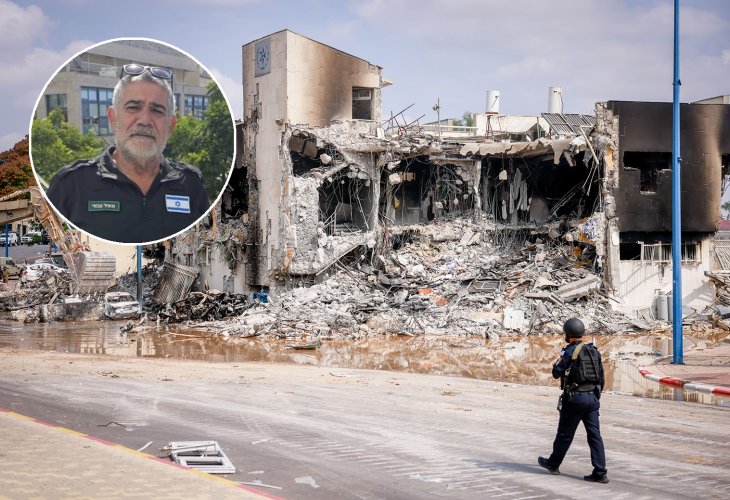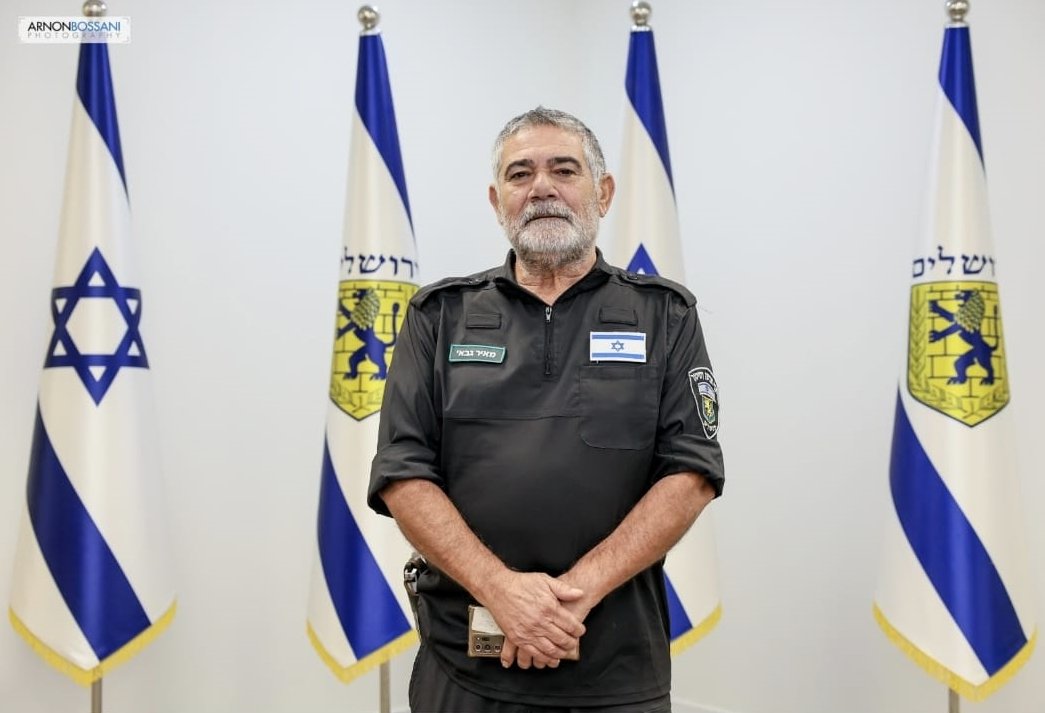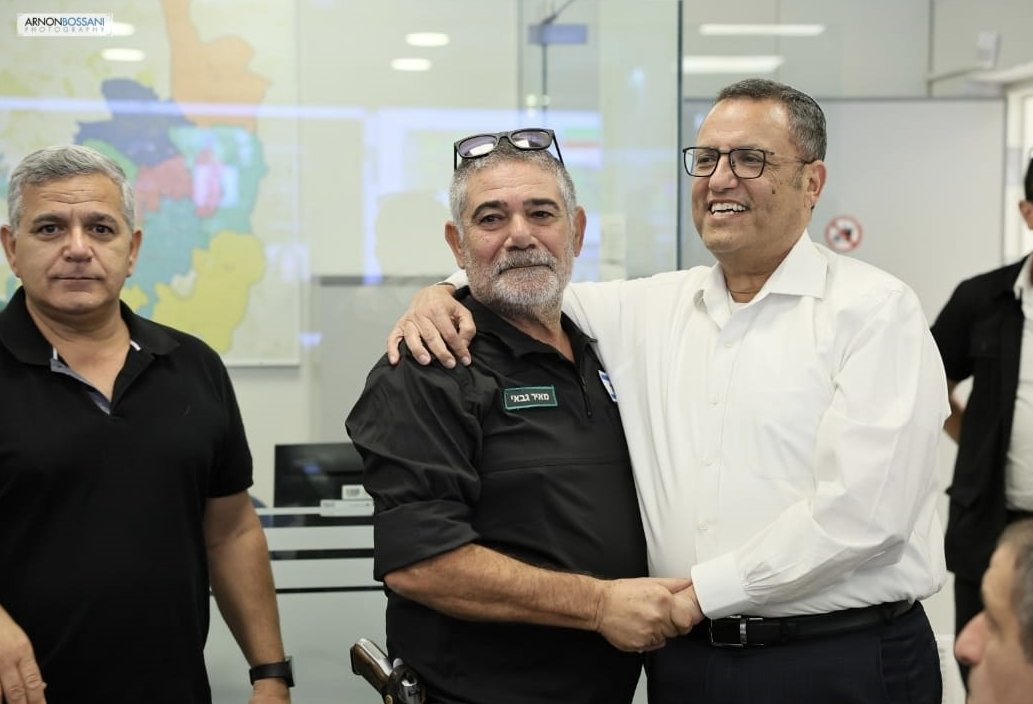I Escaped the Trauma of Sderot, Only to Face a New Trauma
Meir Gabay, Sderot’s "neighbor" to the police station, experienced October 7 in the most painful and traumatic way. Yet, when he sought recovery at a hotel in Jerusalem, he found himself at the scene of a bloody attack.
 The destroyed police station in Sderot (Photo: Haim Goldberg / Flash 90)
The destroyed police station in Sderot (Photo: Haim Goldberg / Flash 90)If you wander the streets of Jerusalem, you might very well encounter him – a smiling municipal inspector performing his duties with dedication and satisfaction. Dressed in municipal uniform like the other inspectors, he blends in seamlessly with them. Nothing betrays that he is Meir Gabay, a resident of Sderot, who under normal circumstances is used to conducting municipal inspections in his hometown. Nothing also reveals the traumas he has endured over the past month that have affected him profoundly.
"Like the other residents of Sderot, my family and I were jolted out of bed on that dark Shabbat morning at six thirty," he recalls. "Of course, we all immediately ran to the safe room, but after a few minutes, when we emerged, my son claimed he heard the sound of gunfire – shots from light weapons. I listened and quickly realized he was right, so I went to the room, grabbed my gun, and went outside to see what was happening in the street."
Incessant Shooting
Meir pauses his story for a moment. Though a month has passed since those events, he seems to be only just beginning to process a fraction of the horrifying hours they endured. "My house is located right next to the police station, which, as you recall, was attacked by terrorists," he explains. "At that time, of course, I didn't realize this, and when I went outside with the gun, I was shocked to see a pickup truck with ten terrorists on it. I immediately realized I had no chance, because even if I hit one, the others would kill me. In a split-second decision, I chose to shoot at the one holding an RPG. He smiled at me and made a 'V' sign with his fingers, and then, apparently, Hashem wanted me to live after all, as a police car passed by. The terrorists turned their weapons towards it and fired, while I took advantage of the moment, hugged the ground, and managed to slip back into the house. Meanwhile, I remembered that my work communication device was charging with me, so I activated it and suddenly, all at once, the situation became clear to me. I realized that there was an takeover of the police station, which, as mentioned, is right next to my house. I understood that there were dead and injured, and although I really wanted to help, I started to realize that if I arrived there alone, I had no chance of doing anything."
 Meir Gabay in his new role (Photo: Arnon Bosani)
Meir Gabay in his new role (Photo: Arnon Bosani)Meir stayed at home with his family, anxiously following developments from afar, hearing and seeing the most horrific sights, yet still not grasping the magnitude of the disaster. According to him, official rescue forces arrived about three hours after the attack began, and he witnessed the heroic battle against the armed terrorists entrenched in the police station. "Some of the terrorists were eliminated or neutralized, but some continued to barricade themselves," he describes. "Meanwhile, Shabbat ended, and then I received a message on my phone that my 30-year-old daughter was missing."
The term "missing" took on a chilling meaning at that time, as it was clear that it could border on immediate life danger. "Despite the strong desire to go and search for my daughter, I grabbed my son's hand and warned him: 'We must work with logic, not emotion,'" Meir recalls. "It was hard for my son to accept this. At one point, he tried to go out the window while the terrorists were still outside, but I pulled him back in. So we spent another night, constantly hearing the gunfight taking place in the nearby police building."
On Sunday morning, Meir's son could no longer stand that his sister was missing, and he left the house without notifying anyone. "He started the car and drove around the city," his father describes, "until he found his sister's car. He saw what he saw there, took photos, and brought some of her belongings. When he returned home with the findings, I was angry with him, but when I saw the photos he had taken, we tried together to analyze and understand where she was and what had happened to her. Initially, we thought she was kidnapped, as the amount of blood in the car didn't seem to justify death. Only the next day did we receive notification of our daughter's death. In hindsight, we understood that apparently one of the terrorists had wounded her, and when she stopped the car to tend to the bleeding, the wicked men shot and murdered her."
Unimaginable Sights
On Monday, another event occurred: it was finally possible to leave the city in relatively safe conditions. Meir sent his entire family to Rosh Haayin, to relatives, while he and his wife went to identify their daughter's body. The next day, Tuesday, the funeral and burial took place, and the family spent the week of shiva in Rosh Haayin.
"When we got up from shiva, I decided to send all the children towards Eilat, where many residents of Sderot had been evacuated, while my wife and I went alone to Jerusalem," Meir recounts. "Honestly, I did it because I felt I was almost collapsing, and I didn't want to show weakness in front of the children. That's how it was; we arrived in Jerusalem, and for the first two days, I stayed closed off in the hotel room, feeling utterly depressed. I couldn't go out to eat or see anyone, I couldn't do anything. My brother, who was also with us, noticed the state I was in, and wisely contacted the Jerusalem municipality, which sent a social worker on their behalf who talked to me and asked me to get down to the lobby a bit. I was convinced, went down, and then I was amazed to find Jerusalem's Mayor, Moshe Leon, waiting for me in the hotel lobby, having come specifically to see me. He hugged me and took an interest in what I had been through. It was very moving. Before we parted ways, he asked me what I did in Sderot, and when I told him I worked in municipal inspection, he immediately spoke with Ilan Sasson, the head of policing in Jerusalem, and informed me that he would schedule me for a shift the next morning. That's how I started working as an inspector in the Jerusalem municipality, and within two days, I was back to being the same Meir I was. My condition improved dramatically."
 Meir Gabay with Jerusalem Mayor Moshe Leon (Photo: Arnon Bosani)
Meir Gabay with Jerusalem Mayor Moshe Leon (Photo: Arnon Bosani)But Meir's story has an unexpected continuation as it turns out that just when he was in Jerusalem, where he thought it would be quiet, another drama awaited him. "It was four days after I arrived," he recalls, "that day an attack occurred on Shivtei Yisrael Street, where a terrorist seriously injured a police officer. I was near the area, and when the call came through, I hurried to the scene along with another inspector who was with me on shift. We spotted a Border Police officer lying on the ground with another distressed Border Police officer nearby who cried out: 'I tried to shoot, but I missed.' We asked him where the terrorist escaped, meanwhile, the first team of Border Police arrived and began a pursuit, while we split into three other directions to scan and ensure there was no additional terrorist. In less than a minute, the Border Police officer caught the terrorist and managed to neutralize him with a shot from a distance of seventy meters. I must point out how incredibly rapid, amazing, and efficient the police's response was, as within minutes numerous forces were on the scene – motorcyclists, the K-9 unit, undercover officers, and even cavalry. There is so much to learn from them. I have no doubt that if there had been such preparedness in Sderot on the day of the massacre, a significant disaster could have been prevented."
On a personal note, how did you feel encountering the terrorist? Did it not bring back all the tough memories from Sderot?
A bitter smile surfaces on Meir's face. "Encountering a single terrorist is nothing compared to what we went through in Sderot," he explains painfully, "I think those who weren't there cannot understand, and I hope they never will. Because we were helpless that Shabbat against dozens of murderous beasts, the scenes there were unimaginable, and we must never forgive them."

